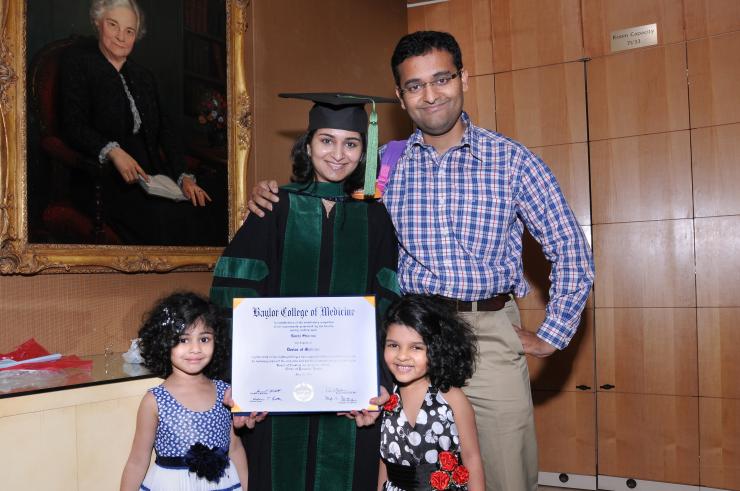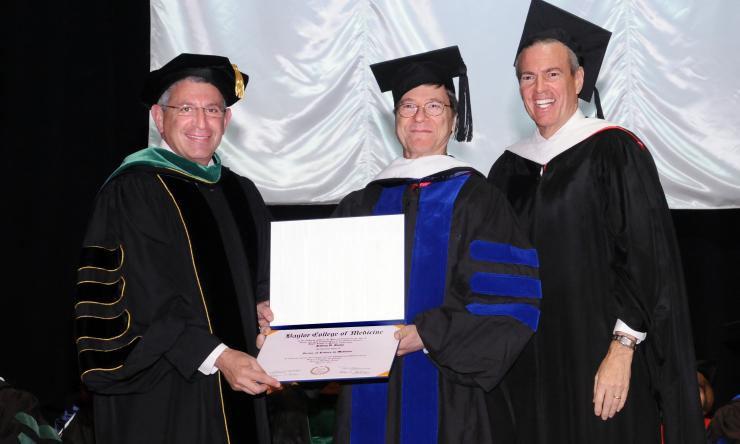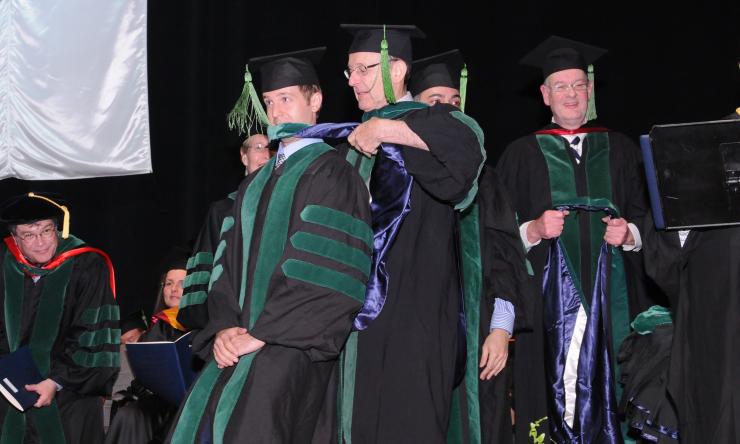Baylor grads challenged: “Become doctors of the planet”

Dr. Jeffrey Sachs, one of the world’s leading experts on economic development and the fight against poverty, told Baylor College of Medicine’s 2014 graduates to “become doctors of the planet” in addition to being medical doctors and scientists.
“Please care for the world’s poor, the world’s unstable and suffering crisis zones, and the physical Earth itself, with the same rigor, professional care, and moral commitment that you will apply to your patients,” Sachs said. “You join the healing arts at a moment that the world needs your skills, passion and virtue.”
Sachs addressed 172 graduates from the medical school and 41 from the Graduate School of Biomedical Sciences, as well as their family, friends and Baylor leaders, faculty and staff Tuesday at the Commencement Ceremony in the Jesse H. Jones Hall for Performing Arts.
Zheng Ma, medical school class president, addressed the audience on behalf of the medical school class and Julienne Leigh Cloud Carstens gave remarks on behalf of the Graduate School of Biomedical Sciences graduating students.
At the ceremony, Baylor President and CEO Dr. Paul Klotman presented honorary degrees to Lester Smith, Adam Walmus, Dr. Peter Palese and Sachs, and a Distinguished Service Award to Dr. Frank Kretzer. Dr. Alicia Monroe, senior dean of education and senior vice president of academic affairs and faculty development, presided at the commencement ceremony.
Klotman told the graduates Kretzer and the honorary degree recipients were selected as role models.
“They have all used their talents wisely and well and have given back to others without hesitation. They are living their lives based on their convictions to make the world a better place,” he said. “Just like you, each of them began their careers with goals and dreams and they turned those dreams into reality.”
Sachs, director of the Earth Institute as well as Quetelet Professor of Sustainable Development and Health Policy and Management at Columbia University, said as a clinical economist, the most important thing he has learned is “we need to have the same care and respect for societies as doctors must have for their patients.”
Noting that an emergency doctor confronting an impoverished patient at mortal risk of starvation would not first lecture the patient about proper eating habits, he said, “The same applies when a country is facing an economic or public health emergency. When a country is overcome by an uncontrolled epidemic such as HIV/AIDS, or a banking collapse, or an acute budget crisis, the first order of business for the world community is to help the hard-hit country to survive.”
“The crisis is not the occasion for sanctimonious lectures or even benign neglect,” he said. “If the world simply stands by when a country is being swallowed by an economic crisis, the result can be violence, epidemic disease, mass migration, or worst of all, outright war.”
“A true emergency-room response – an injection of international aid to stabilize the floundering economy – can repay itself many times over by helping that country to avoid descent to chaos and helping it make a speedy recovery,” he said. “Too often, however, we consider the suffering of others ‘not our business.’ Pope Francis has powerfully described this as the ‘Globalization of Indifference.’”
Sachs praised Dr. Peter Hotez, dean of the National School of Tropical Medicine at Baylor, for his work and for helping him understand that “pandemics could be controlled and at low cost.”
Kretzer, director of anatomical sciences at Baylor, was recognized with the Distinguished Service Award.
“Over the last 38 years he has formed the foundation and shaped the careers of an entire generation of physicians trained here,” Monroe said. “He embodies everything it means to be an educator and his teaching style can be summed up in two words ... positively elegant.”
Smith, of The Lester and Sue Smith Foundation, was awarded the honorary degree Doctor of Humanities in Medicine.
He has served on the Baylor College of Medicine board since 2004 and has been “a tremendous advocate for the College. He has raised community awareness of the College’s bladder, prostate and breast cancer research and treatment programs with spirited events and successful fundraising campaigns.”
Walmus, director of the DeBakey Veterans Medical Center, also was awarded the honorary degree Doctor of Humanities in Medicine.
“Throughout his years at the DeBakey VA, Mr. Walmus has been a remarkable supporter of our education, patient care and research programs,” Monroe said. “Our trainees who rotate through the DeBakey VA have the privilege of caring for veterans in a facility with the highest standards of quality care.”
Palese, chair of microbiology and professor of medicine at the Icahn School of Medicine at Mount Sinai, was presented the honorary degree Doctor of Letters in Medicine.
He is an internationally recognized microbiologist who pioneered the field of reverse genetics for negative-strand RNA viruses, allowing the introduction of site-specific mutations into the genomes of these viruses, Monroe said. “This revolutionary technique has significant implications for understanding and preparing for infectious disease pandemics.”
Sachs also was awarded the honorary degree Doctor of Letters in Medicine.
“His work on ending poverty, promoting economic growth, fighting hunger and disease, and promoting sustainable environmental practices, has taken him to more than 125 countries with more than 90 percent of the world’s population,” Monroe said.
Video from Graduation
Photos From Graduation
See more photos from the event in our Facebook gallery.
Commencement Program
Click this link to view the 2014 Commencement program as a PDF.












